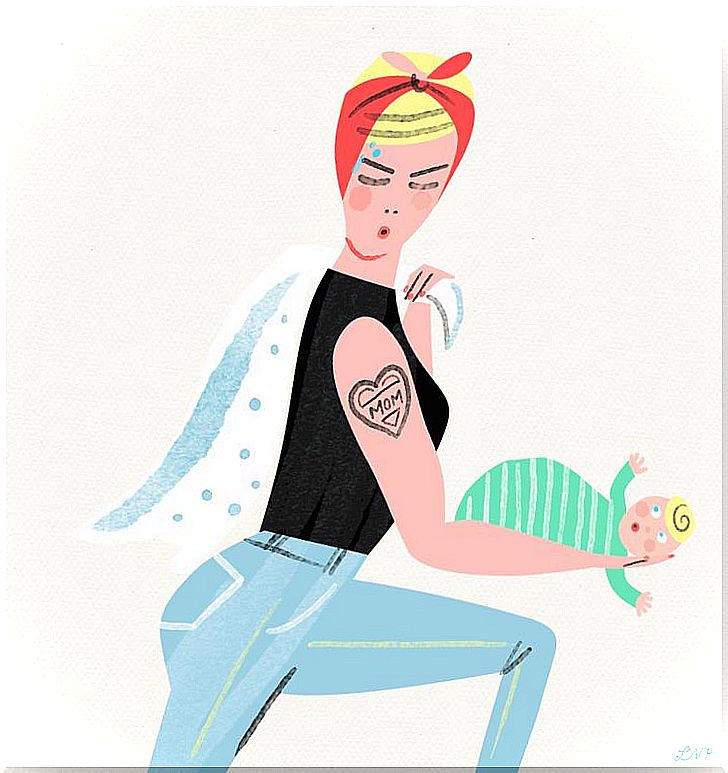The Mothers Who Look After Their Children At Home Also Work

What we all know is that we live in a time when women are required to be almost extremely efficient in almost all areas of their lives. She has to survive in a society that does not forgive mistakes. She has to plan all of her and her family’s activities at home, drive children around and guarantee them their economic well-being. Without neglecting the emotional aspect of the mother-child relationship, of course.
It’s not easy, and yet there are millions of women who manage it every day: raising their children and achieving success rates in their respective professions. But there are many mothers who, for whatever reason, decide to postpone their return to work after giving birth.
Sometimes it is a personal decision, sometimes it is the work context itself and the difficulty of finding a new job that hinder this reintegration into the world of work. But we have to be clear about one thing: the parent who looks after the children at home also works.
We invite you to think about it.
I don’t get a salary, but I work and invest my life in the best project

Having a child is not just a vital project, it is our responsibility, our daily inspiration and someone to whom we will devote the rest of our lives.
- We know that today there is no shortage of mothers who are enthusiastic about returning to work after 16 weeks of maternity leave.
- However , around 80% of couples consider this time to be insufficient.
- If organisms such as the WHO recommend extending breastfeeding up to 6 months, it would be logical that the social organisms would adapt.
Something that is clear to all of us is that our work contexts fail to understand these vital needs. This situation leads many women to simply stay at home to raise their children.
I stay at home, but I don’t validate the classic gender roles
To this day, there are people who are surprised to see a mother who voluntarily chooses this option. The first thing others think is that she is “giving up” valuable time that would allow her to be successful both professionally and personally.
- If you stay at home, you are neither affirming nor giving up anything. You invest in your own children and share valuable time with them. There should be no rush, no schedules, no stress or pressure in parenting.
- On the other hand, it’s also important to mention that there are many men who choose to stay at home. If so, most of the time the man does it because the partner has a better salary. This allows the father to voluntarily decide to postpone his return to work.

Upbringing is a 27-hour job
It is not paid or billed, but there are no breaks or holidays. Any child’s education requires a diploma in patience, a doctorate in specialist knowledge, and a master’s degree in resilience.
- There is little sleep, schedules are not flexible and there are no weekends.
- There are no coffee breaks or restaurant visits on Friday evenings.
Mothers who choose to stay home never complain about their salary. There is no better pay than having your kids smile, hugging, or napping on the couch together.
Norway, a paradise for mothers and families
There is a fact that is clear to all of us. If our social policy invested more in reconciliation, a woman would not hesitate to combine both areas: work and motherhood.
Today, however, there are many women who “lose” their jobs just because they become pregnant.
From the moment something like this happens, we as a supposedly progressive society have failed.
Hence, Norway is one of the most important references when it comes to maternity and paternity laws.

Maternity leave is 56 weeks (approximately 1 year and two months)
- Norwegian mothers can choose between, 46 weeks with 100% of the salary or 56 weeks with 80% of the salary.
- The father enjoys 10 weeks with a full salary
- In addition, they have a guaranteed day care center. In fact, most businesses have one on-site.
- The average working time is 37 hours per week.
- They have 20 days of vacation to look after their children without having to justify them
- The state pays the parents 120 euros per month until the child turns 18.
In conclusion, we can only say that Norway’s ideal model is something that all countries should emulate. This is the only way to invest in equality and, above all, in bringing up a child and in the new generations of the future. Remember, never discriminate against a woman who, for whatever reason, stays home to care for her children: She also invests in the future.









